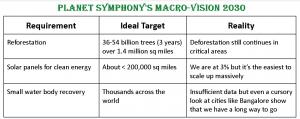“Shift Defence Budgets to fight Climate Crisis” - Planet Symphony
City of Middleton declares 22 June as Planet Symphony Day
The climate crisis is bigger than every war mankind has seen so far, as we’re combating both climate and time.”
MADISON, WI, US, June 25, 2019 /EINPresswire.com/ -- “Shift Defence Budgets to fight Climate Crisis” - Planet Symphony— Chitravina N Ravikiran, Founder Planet Symphony
City of Middleton declares 22 June as Planet Symphony Day
Madison, 24 June 2019
Hundreds of award-winning artists and students of the Planet Symphony Orchestra were recognised for their collective efforts to highlight the environmental emergency by the City of Middleton, USA which declared 22 June every year as Planet Symphony Day. Their recording of the 8-minute, 12-part, 72-scale Climatrix Symphony, launched on World Environment Day (5 June, 2019) is the world’s largest multinational, multicultural artistic call for climate action.
The biggest war, ever: “The Planet Symphony is deeply appreciative of the City of Middleton’s gesture. But we are all acutely aware that plenty needs to be done all around and are keen to create a platform for the same, since the most extreme scientific estimates give us barely five years to save ourselves from an environmental meltdown”, said Chitravina N Ravikiran, initiator of the Planet Symphony movement, which has members from 65 countries. “The climate crisis is bigger than every war mankind has seen so far, as we’re combating both climate and time. The only solution is for Governments to agree to work as one and allocate huge chunks from the US$1.6 trillion that is their combined defence budgets now to defend the planet by eliminating the excess CO₂ by natural and technological means”.
The allocation would be sufficient at $150 per tonne to remove CO₂ provided that emissions do not go up post-2020 and reforestation enables trees to lock away at least 100/700 gigatonnes of CO₂ by 2100. If we reduce emissions by 6% every year from 2020, we will only need to remove about 150 gigatonnes of carbon, which can significantly bring down both cost and effort. But when scientists give only up to 2025 (or even 2030), everything has to be fast-forwarded exponentially.
KEY ISSUE: Too many micro-visions
Though every effort counts and there are broad (dis)agreements between nations on general issues, it is imperative to create and constantly monitor a real-time Common Central Data Monitoring System that tabulates quantified macro-targets and results accomplished, to enable Governments, corporates, academic & environmental institutions and concerned citizens to cohesively evolve solutions within required timelines.
“Even creating 10 square miles of forest, or recovering five water bodies - though phenomenal - need to be appreciated against the backdrop of how many more million square miles of forest the planet still needs and how many more water bodies need to be salvaged and how soon”, Ravikiran explains. The embedded table outlining PSO's Macro Vision 2030 will attempt to put some issues in perspective.
Reforestation: Planet Symphony estimates show that we need a total of 36-54 billion trees within the next 2-3 years to create 1.4 million square miles of healthy forests with 40-60 trees per acre, as recommended in a recent article by a leading publication by 2030. This can be achieved by blending manual and mechanical means like smart tree-planting drones and progressive moves like the Graduation Legacy for Environment Act of the Philippines. Provisions in countries like India to destroy a forest to ‘develop’ one region and plant another elsewhere are fatal to numerous endemic species.
Urban tree planting and projects like the Planet Symphony’s Greening the Roofs with both potted plants and solar panels have to happen in parallel. Reducing CO₂ through other means need to be explored too as the impact of planting billions of trees on agricultural land, food production, environmental cost of using fertilizers and water to sustain them have consequences.
Solar power: Assuming 3.4 acres of solar panels to generate one GWHour of electricity over a year, the entire world would need about 191,817 sq miles of solar panels by 2030 (even less area, with improving technology). But solar power percentage is a miniscule 3% of global consumption today. Therefore it is important and definitely not impossible to scale it up massively.
Water-body management: While reviving huge lakes would be possible only for large Governments, organisations like the Planet Symphony aim to recover smaller water bodies through Events for Environment (EfE). But information gathering regarding this is complex as the situation with respect to thousands of tiny water bodies are so fluid, given global warming and thoughtless development. Reputed academic institutions could make region-wise water-body data-creation mandatory assignments for students and also recommend the ideal number of new water bodies that need to be created. It is equally essential to scale-up innovations like air-to-water makers (for humid regions) and also ensure that recovered lakes are not lost again.
Pioneers like Israel have illustrated the impact of scientifically developed agricultural and water management solutions. Cities like Cape Town and Chennai are already without water, thanks to insensitive construction, flawed designs of rain water harvesting mechanisms and Storm Water Drains that push rainwater out into the sea.
Planet Symphony plans: “We are planning on fundraisers for solar power for educational, cultural and even religious institutions in collaboration with alumni, enthusiasts, and devotees and also pursuing high-school & college level CSR (redefined to Climate Solution & Resource) competitions, with prizes for economical, eco-friendly, scalable solutions and innovations for desalination, energy or plastic alternatives etc”, said an office-bearer of the Planet Symphony.
"We have to recover water bodies, re-cover forests and uncover green energy. Silencing or ignoring the voice of science would lead us back to the dark ages in quadruple quicktime”, Ravikiran concluded.
CONTACT: melharmonymusic@gmail.com or ravikiranmusic@yahoo.com
Phones and/or whatsapp: (+1) 608 215 6967, (+1) 626 354 4329, (+91) 98401 22711
Director - Public Relations and Communications
Melharmony Foundation
+1 626-354-4329
email us here
Visit us on social media:
Facebook
Twitter
LinkedIn
CLIMATRIX SYMPHONY - Planet Anthem by Planet Symphony Orchestra


